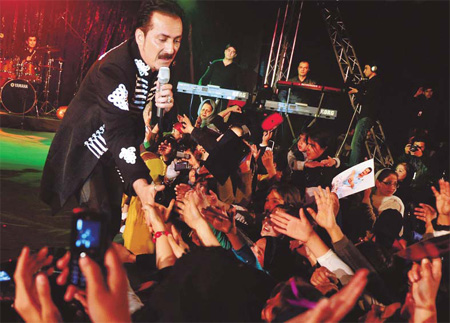'Afghan Elvis' wows women fans
 0 Comment(s)
0 Comment(s) Print
Print E-mail
China Daily via Agencies, November 28, 2011
E-mail
China Daily via Agencies, November 28, 2011
Dubbed the "Afghan Elvis", Farhad Darya may be the only man in Afghanistan who can reduce an audience of women in headscarves to a screaming, waving, whistling throng.
 |
|
Singer Farhad Darya, dubbed the "Afghan Elvis", performs during a concert for Afghan women at Amani high school in Kabul on Thursday.?[Massoud Hossaini/China Daily via Agencies] |
In a country where music was banned under the Taliban until 10 years ago, Darya is an icon for millions and his popularity was clear at a rare, top-security, female-only show in Kabul.
Despite the excitement, Thursday's gig, shrouded in secrecy due to fears it could be targeted by the Taliban, was a far cry from a typical concert in many other parts of the world.
Several hundred women, from students to middle-aged mothers, swayed as Darya performed but they did not dance due to the presence of television cameras. Women dancing in front of strange men is taboo in Afghanistan.
One even dared to shout out: "We love you!" halfway through - a standard greeting for male rock stars around the world but exceptional in a nation where female sexuality is a highly sensitive topic, even in relatively sophisticated cities like Kabul.
"I've always told everyone he's my dream man - he sings so good," said one excited fan, 18-year-old student Meetra Alokozay.
Darya, a UN goodwill ambassador described by the organization as "one of the best role models" in Afghanistan, held the concert to spotlight a campaign against domestic violence, which is still widespread here.
It was the latest in a series of ecstatically received free performances he has given across the country.
He said that he hoped the event could be an outlet for fans and help people outside the country realize there was more to Afghan women than "burqa, chador (a similar head-to-toe veil), suffering and sitting next to the kitchen".
But he also argued that music in Afghanistan is about far more than sheer entertainment.
"Here, people expect a lot from artists. A musician, a singer can deliver the biggest message in this country and he can be heard big time."
This is often reflected in the songs from his 35 albums, many of which have a strongly political, pro-peace flavor.
His song Kabul Jaan (Beloved Kabul) was the first song played on Afghan radio after the Taliban was ousted by a US-led invasion in 2001.
It contains lyrics like: "I'm a voice for my poor people/I'm an old rubab (a lute-like musical instrument) singing songs of sorrow to my friends."
Although Darya moved abroad in 1990 and currently lives in the United States, he spends much of his time in Afghanistan and is alert to the threats that come from 10 years of war.
After one of his concerts last year in the western city of Herat, 13 fans were wounded by a bomb outside the venue. Darya said the blast happened next to the door through which he had been due to leave.
Nevertheless, he does not travel with security guards because he does not want to look like he is "afraid of people".
"I know the risks, I know, everybody knows those risks but I'm trying not to show off with security," he said. "I would rather work with the locals to feel secure rather than being surrounded with gunmen."
Afghanistan has made great progress in the last decade, he said, but added it was too soon to know what would happen when US-led NATO combat troops leave in 2014.
"The people of Afghanistan, they can see these achievements but they cannot believe it's real," he said. "The very important thing is that Afghans should take over because they need to believe in themselves."
And that is where Darya said singers like him can help bring peace and improve women's rights - by changing hearts and minds.
"I see that my music can have this impact. This is a tool, I can help life here, so why shouldn't I do it?" he said.





